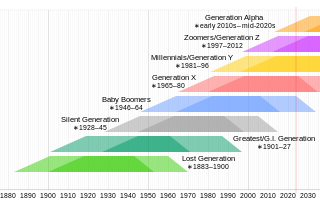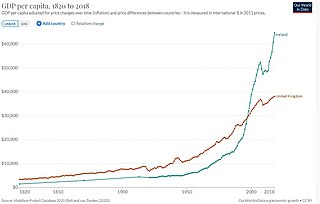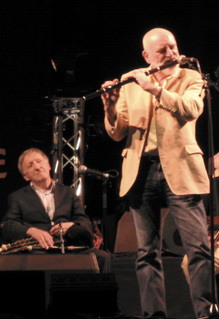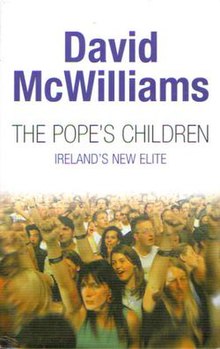
Generation X is the demographic cohort following the baby boomers and preceding the millennials. Researchers and popular media use the mid-to-late 1960s as starting birth years and the late 1970s to early 1980s as ending birth years, with the generation being generally defined as people born from 1965 to 1980. Harvard University defines Generation X as those people born between 1965 and 1984. By this definition and U.S. Census data, there are 65.2 million Gen Xers in the United States as of 2019. Most members of Generation X are the children of the Silent Generation and early boomers; Xers are also often the parents of millennials and Generation Z.

The "Celtic Tiger" is a term referring to the economy of Ireland from the mid-1990s to the late 2000s, a period of rapid real economic growth fuelled by foreign direct investment. The boom was dampened by a subsequent property bubble which resulted in a severe economic downturn.

The bourgeoisie is a sociologically defined social class, equivalent to the middle or upper middle class. They are distinguished from, and traditionally contrasted with, the proletariat by their affluence, and their great cultural and financial capital. They are sometimes divided into a petty, middle, large, upper, and ancient bourgeoisie and collectively designated as "the bourgeoisie".

Traditionally, a delicatessen or "deli" is a retail establishment that sells a selection of fine, exotic, or foreign prepared foods. Delicatessen originated in Germany during the 18th century and spread to the United States in the mid-19th century. European immigrants to the United States, especially Ashkenazi Jews, popularized the delicatessen in U.S. culture beginning in the late 19th century. More recently, many larger retail stores like supermarkets have "deli" sections.

Eamon Martin Dunphy is an Irish media personality, journalist, broadcaster, author, sports pundit and former professional footballer. He grew up playing football for several youth teams including Stella Maris. Since retiring from the sport, he has become recognisable to Irish television audiences as a football analyst during coverage of the Premier League, UEFA Champions League and international football on RTÉ.

The Chieftains are a traditional Irish folk band formed in Dublin in 1962, by Paddy Moloney, Seán Potts and Michael Tubridy. Their sound, which is almost entirely instrumental and largely built around uilleann pipes, has become synonymous with traditional Irish music. They are regarded as having helped popularise Irish music around the world. They have won six Grammy Awards during their career and they were given a Lifetime Achievement Award at the 2002 BBC Radio 2 Folk Awards. Some music experts have credited The Chieftains with bringing traditional Irish music to a worldwide audience, so much so that the Irish government awarded them the honorary title of 'Ireland's Musical Ambassadors' in 1989.
Thomas Francis O'Rahilly was an Irish scholar of the Celtic languages, particularly in the fields of historical linguistics and Irish dialects. He was a member of the Royal Irish Academy and died in Dublin in 1953. He is the creator of O'Rahilly's historical model, which has a mixed legacy.

David McWilliams is an Irish economist, writer, and journalist. McWilliams initially worked as an economist with the Central Bank of Ireland, UBS bank and the Banque Nationale de Paris. Since 1999, he has been a broadcaster, writer, economic commentator and documentary-maker. He has written five books, The Pope's Children , The Generation Game, Follow the Money, The Good Room and Renaissance Nation, and written regular columns for the Irish Times and Irish Independent.
Newstalk is a national independent radio station in Ireland. It is operated by News 106 Limited, a subsidiary of Bauer Media Audio Ireland, and broadcasts under a sound broadcasting contract with the Broadcasting Authority of Ireland.

The Irish property bubble was the speculative excess element of a long-term price increase of real estate in the Republic of Ireland from the early 2000s to 2007, a period known as the later part of the Celtic Tiger. In 2006, the prices peaked at the top of the bubble, with a combination of increased speculative construction and rapidly rising prices; in 2007 the prices first stabilised and then started to fall until 2010 following the shock effect of the Great Recession. By the second quarter of 2010, house prices in Ireland had fallen by 35% compared with the second quarter of 2007, and the number of housing loans approved fell by 73%.

The breakfast roll is a bread roll filled with elements of a traditional fried breakfast. It is served at a wide variety of convenience shops, newsagents, supermarkets, petrol stations, and casual eateries throughout Ireland.
Ronan Hardiman is an Irish composer, famous for his soundtracks to Michael Flatley's dance shows Lord of the Dance, Feet of Flames and Celtic Tiger Live.
In Search of the Pope's Children is an Irish television programme based on the book The Pope's Children, aired by the state broadcaster RTÉ and British broadcaster BBC Four. The programme is a three-part true lives documentary, presented by economist David McWilliams. The show comments on the Irish economy and the social attitudes surrounding it. The show is marketed as being sharp, witty and argumentative.
Peter McKenna is a former Irish Rugby International, author, broadcaster and solicitor.
Quentin Fottrell is an Irish columnist, author, agony uncle, journalist, social diarist and critic. He was the Irish correspondent for Dow Jones Newswires and The Wall Street Journal from 2003 to 2011, columnist and feature writer for The Irish Times and is currently working as a journalist in New York City. He was born in Dublin and studied psychology in University College Dublin (UCD) and journalism in University College Galway (UCG).
A ghost estate is an unoccupied housing estate, particularly one built in the Republic of Ireland during the period of economic growth when the Irish economy was known as the Celtic Tiger. A massive surplus of housing, combined with the late-2000s recession, resulted in a large number of estates being abandoned, unoccupied or uncompleted. In 2010 there were more than 600 ghost estates in Ireland, and a government agency report estimated the number of empty homes in Ireland at greater than 300,000. The National Institute for Regional and Spatial Analysis defines a ghost estate as developments of "ten or more houses where 50% of the properties are either vacant or under-construction", which therefore does not fully cover the total number of unfinished estates. The 2011 Census lists the number of empty homes to be around 230,000, around 26% of which are apartments, despite the fact that only 11% of the occupied homes are apartments. Of the 230,000 empty homes in the 2011 census, around 10% of these were in ghost estates. In November 2013, the number of vacant units in unfinished estates was 6,350. As at December 2014 there were 5,563 vacant homes in unfinished estates, however this figure is revised down to 4,453 homes as the difference is 1,110 vacant homes in estates no longer deemed to be unfinished. This means that the number of vacant homes in unfinished estates in 2014 had decreased by 30% in one year. The report for 2015 lists the number of vacant homes in unfinished estates to be 2,542. Vacant homes do not include derelict houses and homes under construction.
Peter Clinch is an Irish academic and economist, who has served as Chairperson of Science Foundation Ireland.

PS, I Scored The Bridesmaids is a 2005 novel by Irish journalist and author Paul Howard, and the fourth in the Ross O'Carroll-Kelly series. The title refers to the novel PS, I Love You by Cecelia Ahern.
Éabha McMahon is a contralto Irish singer and a former member of the ensemble Celtic Woman. In 2020 she began recording music under the name AVA.
Bobo is a portmanteau word used to describe the socio-economic bourgeois-bohemian group in France, the French analogue to the English notion of the "champagne socialist". The geographer Christophe Guilluy has used the term to describe France's elite class, who he accuses of being responsible for many of France's current problems.










